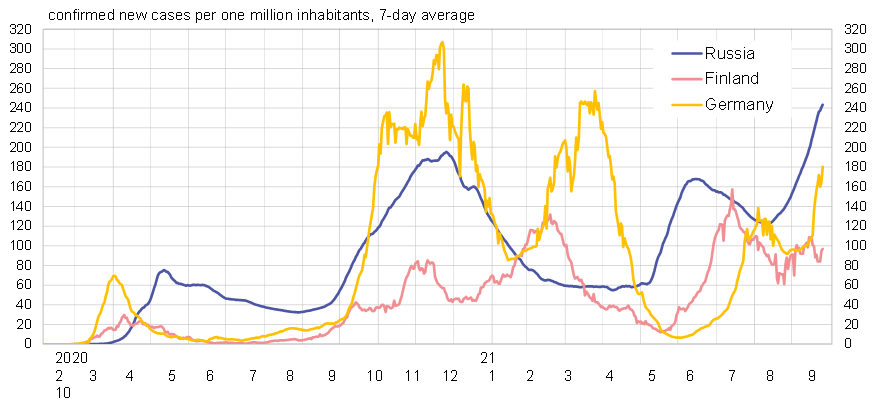BOFIT Weekly Review 43/2021
With covid cases soaring, Russia implements short partial lockdowns on several parts of the economy
Following a cabinet recommendation, president Vladimir Putin last week decreed paid leave days from October 30 to November 7. Large part of firms and the public sector offices would have been closed in any case due to the holidays in November 4–7. The decree empowers the leaders of administrative regions to impose restrictions also before and after the decreed period depending on the covid and healthcare situation. The decree does not delineate branches, but requires the government and regional governments to define the working of healthcare and cultural branches and public organisations to maintain sufficient staffing to operate effectively. Under the president’s newest guidance, restaurants and bars must be closed between 11 pm and 6 am. 30 % of unvaccinated workers and all unvaccinated workers over 60 will be shifted to remote work almost until the end of February.
The City of Moscow and the Moscow region imposed partial restrictions from October 28 to November 7, and St. Petersburg from October 30 to November 7. The lockdown covers shops except pharmacies and other firms where at least 30 % of sales consist of necessities, restaurants and cafes, excluding take-away or e.g. services for persons staying in hotels and other accommodation, as well as firms in various services branches. Banks are not listed for closure. Public services will not be offered at their usual operating sites, but remotely. Naturally, this will not apply to nursing care, and neither to certain cultural branches. Schools are closed. Restrictions in at least six other administrative regions have already been in place since October 25.
The restrictions are expected to reduce the rise of Russian GDP for all of 2021 by a couple of tenths of a percentage point. On the other hand, the government will again support small and medium-sized enterprises (SMEs) in the hardest-hit branches to compensate for part of their losses caused by these restrictions and the current introduction of covid passes. Assistance for SMEs was also noted in the president’s decree. The government has approved a one-time support for SMEs in these branches to the amount of one-month’s minimum wage per employee. About 3 million people are estimated to be eligible for this assistance.
The cabinet is also preparing a support package with about 30 banks. It is based on a covid spring 2020 model, whereby companies in the hardest-hit branches are eligible for loans with state guarantees and interest subsidies at a 3 % interest rate on the condition that they retain at least 90 % of their workforce during the time of the loan (up to 18 months). For its part, the CBR recently decided on a credit package that provides banks with CBR loans at 4.5 % p.a. backed by guarantees from a specialised SME company on the condition that the banks then lend the funds on to SMEs in the affected branches at rates not in excess of 8.5 %. Certain regional governments are also planning covid supports e.g. in the form of tax reliefs.
Covid has risen in Russia. The number of confirmed cases has increased rapidly since mid-September, climbing to current peak levels (about 36,000–37,000 cases a day during the last seven days). The number of hospitalised covid patients has doubled since June to about 260,000. The number of beds available to them has also been increased with almost the same pace, mainly by repurposing beds. About 10 % of covid beds in hospitals are available. The daily number of covid deaths has also soared in recent weeks.
Only about a third of the Russian population has had two jabs of covid vaccine. About 36 % have had at least one jab. After dropping off during the latter part of the summer, the pace of vaccination picked up considerably this month. The president this week tasked the cabinet with preparing a recommendation that employers give employees two paid free days for their covid vaccinations.
Russian vaccine exports have shot up this year. For the first five months of this year, vaccine exports were valued at over $300 million, up from an average of $60 million per year in 2018–2020. Booked orders are currently reported for about 700 million doses, with the biggest orders from India, Palestine and countries in South America. Russia has also licenced the manufacture of over three billion doses of its vaccines to production facilities, especially in South Korea and India, and also China.
The number of covid infections in Russia has soared in recent months to peak levels

Sources: Our World in Data and BOFIT.